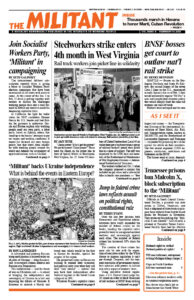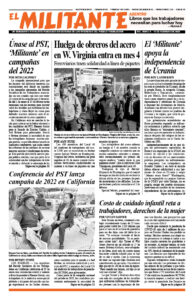Tens of thousands of Cuban workers and youth marched in Cuba’s provinces Jan. 27, the eve of the 169th birthday of Cuba’s national hero, José Martí. Called the March of the Torches, this annual event celebrates the anti-imperialist and revolutionary legacy of the central leader of Cuba’s 19th century independence struggle against Spain, and opponent of the U.S. rulers’ efforts to seize Cuba as their colony.
The action was organized by Cuba’s Federation of University Students (FEU) and the Union of Young Communists.
In the front lines of the Havana march were Army Gen. Raúl Castro, President Miguel Díaz-Canel, Rebel Army Commander José Ramón Machado Ventura and FEU President Karla Santana. The demonstration gathered on the steps of Havana University and marched to Martí’s Forge, the site of a former quarry where Martí was put to forced labor in 1871 when he was imprisoned for his political activities at the age of 17.
Santana invited the young marchers to attend FEU’s 10th congress later this year, to become like Martí among “those who dream, the foolish and the indispensable, the militants of life who live their youth afire.”
In the first March of the Torches on Jan. 27, 1953, revolutionary leader Fidel Castro led a contingent in the first large street action opposing the U.S.-backed Fulgencio Batista dictatorship, which took power in a military coup the previous year. Batista banned the action, but 5,000 young Cubans took to the streets.
Martí was a revolutionary fighter, poet, writer, speaker, journalist and combatant. He founded the Cuban Revolutionary Party in 1892 and organized the 1895 independence war against Spanish colonial rule, where he was killed in a battle with Spanish troops. His anti-imperialist program and revolutionary writings are at the center of Cuba’s traditions and political heritage.
A week earlier, the U.S. rulers had to back off smears against Cuba they’ve used to step up their attacks against the revolution. In a political reversal, the CIA issued a report admitting that the so-called Havana Syndrome doesn’t exist. Previously the spy agency, and both the Donald Trump and Joseph Biden administrations, claimed that U.S. diplomats have been targeted in a “sustained global campaign by a hostile power.”
The U.S. rulers alleged their diplomats in Havana in 2016, then later in other embassies around the world, had been the victims of mysterious covert “sonic attacks.” Washington used the false charge to slash its Havana embassy personnel in half, expel 15 officials from the Cuban Embassy in Washington, D.C., and to issue a “do not travel” advisory for those planning to visit the island to further justify its punishing economic war against the Cuban Revolution.
The State Department said embassy personnel in Cuba had suffered symptoms, including “ear complaints, hearing loss, dizziness, headache fatigue, cognitive issues and difficulty sleeping.”
Now the CIA admits the vast majority of those cases “can be explained by environmental causes, undiagnosed medical conditions or stress,” wrote the New York Times Jan. 20.

